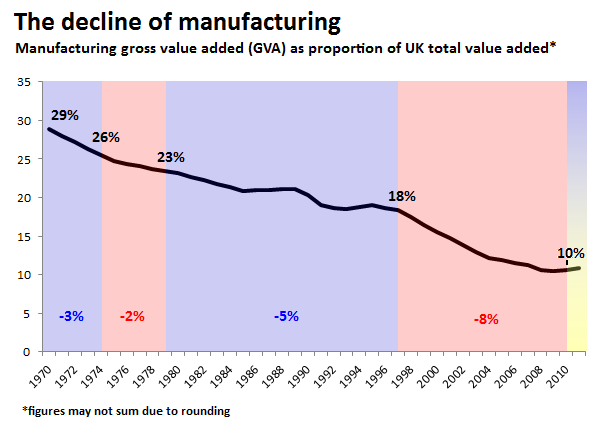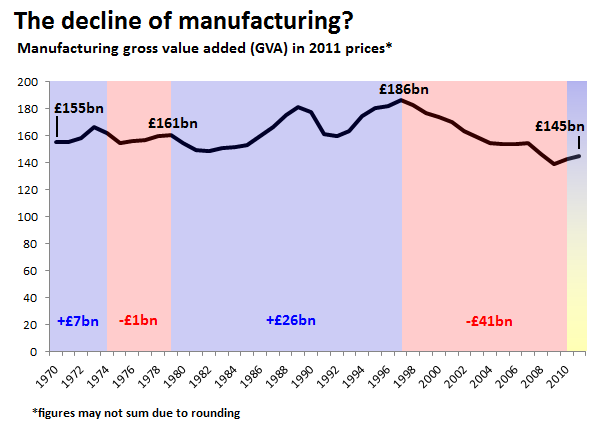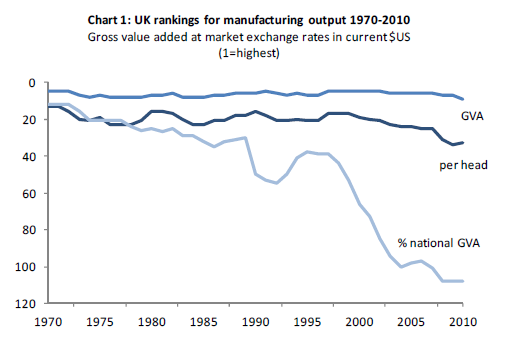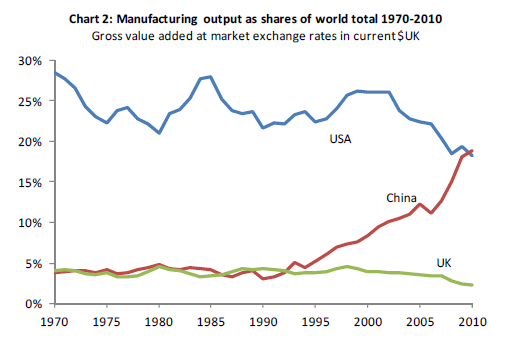Did Labour decimate manufacturing?
"The first point is that manufacturing declined as a share of our GDP faster under the government of which he was a member than at any time since the industrial revolution. That is what happened; the decimation of the manufacturing industry under ten years of a Labour government, that is what happened."
David Cameron, Prime Minister's Questions, 13 March 2013
"The manufacturing sector halved as a share of the British economy when Labour was in office and we had the fastest decline in British manufacturing in British history."
George Osborne, Treasury Questions, 12 March 2013
Join 72,953 people who trust us to check the facts
Sign up to get weekly updates on politics, immigration, health and more.
Subscribe to weekly email newsletters from Full Fact for updates on politics, immigration, health and more. Our fact checks are free to read but not to produce, so you will also get occasional emails about fundraising and other ways you can help. You can unsubscribe at any time. For more information about how we use your data see our Privacy Policy.
Last week the Office for National Statistics released disappointing manufacturing figures which revealed that manufacturing fell by 3% since the same time last year. This was ample opportunity for the opposition to open fire, forcing the Government to defend itself. It did so yesterday and today by drawing attention to Labour's own record, claiming the Labour Government presided over the "decimation" of the manufacturing industry.
So did Labour really bring manufacturing to its knees?
Getting historical numbers on different industries' share of the economy isn't easy, especially prior to 1997. For post 1997 data, you need to consult the Blue Book 2012 which breaks down 'Gross Value Added' (GVA) at current basic prices (i.e. nominal, not real) by industry, one of which is manufacturing. Page 129 of this PDF also provides the numbers.
Getting data from before 1997 requires looking further afield, to the United Nations 'National Accounts Main Aggregates Database' which provides nominal manufacturing data going back to 1970. It isn't exactly the industrial revolution, but it's a reasonable place to start.
To the numbers. Right now, manufacturing's gross 'value of goods' (GVA) stands at £145 billion. In other words, we can say that it adds £145 billion to the UK economy. Total Gross Domestic Product (GDP) in 2011 stood at £1.3 trillion (£1,300 billion). So manufacturing makes up 11% of GDP.
Using the historical data, we can track back manufacturing's share of the economy to check the Prime Minister's claim:

Under the total time Labour was in office, manufacturing fell from a share of 18% of the economy in 1997 to 10% by 2010 (the closest available approximations). Up to the end of Tony Blair's premiership it fell to 11% by 2007. No previous stint of government for any party since 1970 saw this level of decline from start to finish.
But that isn't the whole story - the 1970-74 government of Edward Heath presided over a steeper slide in manufacturing's share per year, falling by almost 1% point per year.
We also need to take into account the reason for manufacturing's relative decline, which doesn't necessarily mean manufacturing itself has declined at all. For instance, from 1997 to 2010 the service sector rose by nearly 8% points, from 69% of the economy to 77%.
Looking at manufacturing in isolation, and adjusting the figures to match 2011 prices (real terms) can show us what has happened to British manufacturing irrespective of the rise in services:

Taking the performance of other sectors out of the equation confirms that manufacturing did decline under Labour's previous time in office (alongside the growth in services). In fact, manufacturing rose in real terms during both previous Conservative stretches in office, and fell during Labour's spells.
Thanks to the growth of other sectors such as services, manufacturing has remained in relative decline throughout.
And finally, some perspective
It's simplistic to conclude from any of these statistics that Labour or the Conservatives caused every ebb and flow on the manufacturing graphs, there is a wider context to consider the numbers in. One such context is to look abroad, and see how other nations have fared over the same period.
The House of Commons Library helpfully collates international data, again from the UN's National Accounts Database.
The chart below shows how the UK has actually held a very high world ranking for the actual value of manufactured goods (GVA) although this has fallen off in recent years per head. Again, it's the proportion of national income that has changed. The UK's world ranking has transformed thanks to the 'rebalancing' of the economy to other sectors:

Furthermore, the second graph shows how the UK's manufacturing share of the total world economy has been squeezed almost constantly since the beginning of the 1980s, and since 1990 China has soared to overtake the formerly-dominant USA:

Conclusion
The Prime Minsiter and Chancellor are correct to highlight the decline in manufacturing under Labour, but we need to look a bit deeper to understand what's actually going on. The actual value of manufacturing went up during the previous two Conservative stints in office and down under Labour's, but as a share of the total UK economy has been in constant decline.
The UK's international standing hasn't changed a great deal in terms of the actual value of stuff we manufacture, the transformation lies in the way our economy is balanced, which in recent years has seen sectors such as financial services and government health and education soar at the expense of manufacturing.
Whether this is set to continue or not remains to be seen, but given the rising power of economies abroad, it might not be entirely the Government's decision.